Hakuna Movement. Changes nothing, changes everything.
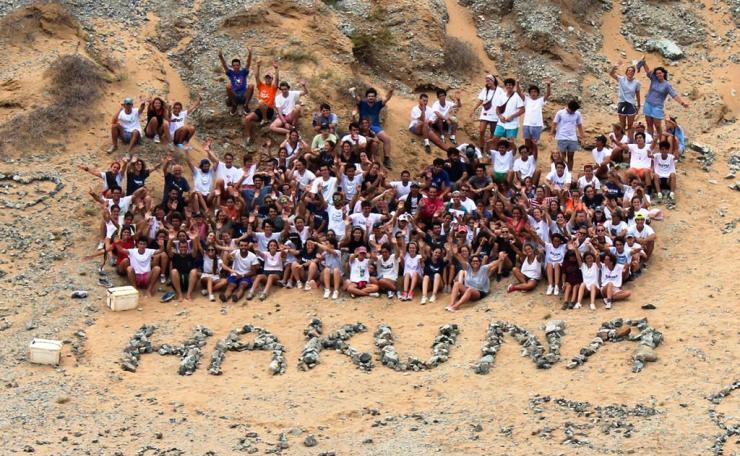
Hakuna is setting the lives of many young people ablaze, inside and outside the confines of the Church, through prayer, music, formation and service to those in need.
The name Hakuna which means âthere is notâ, in Swahili, came as a shortened form of Hakuna matata (no problem). Chosen by chance, it ended up embodying the spirit of those who believe that there is nothing done without God and there are no problems beyond His reach; of those who make no plans or strategies but put their trust in Him.
It is also difficult to date its origin.
If we talk with some of the young people who were present at the primordial event, they probably agree that around 2012 something different was beginning to happen in Madrid.
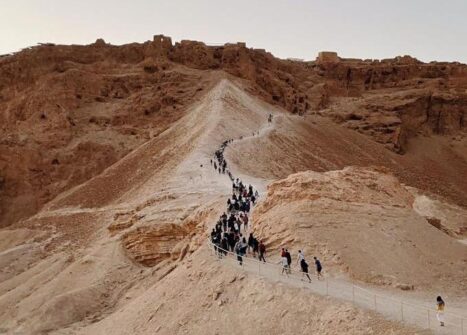
Youth pilgrimage in Jerusalem,2022. Ascent to the city of Masada. Photo: Hakuna.
Father JosĂ© Pedro Manglano (Josepe) was stationed in the parish of San JosemarĂa in Madrid and one of his duties was to accompany the parishâs young people – and so he did; they set their sights on World Youth Day (WYD) in 2013, which was going to be held in Brazil, and they began to prepare for it. At first, the trip was organised for 20 people, but in the end, almost 100 went.
The trip consisted of a compartiriado (which is what they call a voluntary service in Hakuna), in Nueva Friburgo, Brazil, with children and elderly people. They celebrated Mass and Holy Hour every day.
Afterwards, they joined the WYD with the Pope, in which Pope Francis pronounced that famous speech to the youth inviting them to âmake a fussâ. That simple phrase began to light the fuse for something new in the lives of these young people, although they were not yet aware of it.
That is how Hakuna came into being; without planning it, without any roadmap or anything pre-established. It was born out of Life, out of those Holy Hours, out of those moments kneeling before Christ in the Holy Eucharist, shared as a family. Pope Francis himself describes them as a great Eucharistic family.
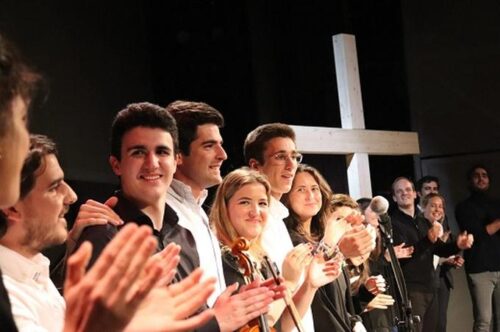
Young people of Hakuna Group. âOur message for everything is always how much love we put into what we doâ. Photo Hakuna
When they returned from the WYD, these young people continued to meet every week for talks and Holy Hours. They also began to do volunteer services in Madrid. They did not want what they had experienced to remain just a summer experience and so they started organising getaway trips to Tangier, Morocco, during Easter and to India during the summer. Friends from other cities began to join them – and so it has gone on until today.
One of the most important moments for the group is the âHoly Hoursâ. Â It is a time of silence and contemplation. Â Every week, thousands of young people gather in groups all over the world to celebrate these Holy Hours. First, there is a formative session and then, a time of silence interspersed with songs of Hakuna Group Music, the reading of the Gospel and a brief reflection.
Hakuna Group Music
It defines itself as âa music group of the 21st century, composed of young people who, through their passion for music, wish to tell the world the truth which they live and carry deep inside.â
Each of their songs is a world in itself, as they each tell a different story, offer a different dedication and present a different composer.
Thatâs why it is said that Hakuna Group Music is the worldâs biggest music group, because every member, in every city where Hakuna is present, is part of Hakuna Group Music.
The history of the group began at the WYD in Rio in 2013, and in those first Holy Hours at the return from that world youth gathering.
Some of the members of the group, with great musical zeal, wanted to help others to pray through music. Soon, the first ideas and original songs began to emerge.

QAOS album presentation concert in Madrid. Photo: Hakuna
In the summer of 2014, the idea of recording a studio album came up. There was a great desire to bring something new to the Spanish music scene. Religious music, yes but, apart from being proudly addressed to God, it brought a very youthful, joyful and professional touch.
The first album finally saw the light in 2015, a new stage in the groupâs career, in which they began to give concerts in different cities in Spain. From that moment on, it has been developing non-stop. In 2017 they presented their second studio album, Mi pobre loco (my poor crazy), and in 2018 the third, PasiĂłn (Passion). Sencillamente (Simply) came out at the time of the full Covid-19 lockdown and was presented at Palacio Vistalegre in Madrid in September 2021, in front of 2 500 spectators. Their latest album Qaos (chaos) was also presented at Vistalegre, in front of more than 8 000 people. The echo of this concert unexpectedly reached the media and social networks.
Sharing
The compartiriado (Sharing) is a social action initiative developed in Hakuna: âWe believe that these are experiences in which we share and grow together, preserving the beauty and truth of each way and style of lifeâ. It is a medium that âchanges nothing and changes everything, offers no immediate material solution, but makes a great spiritual impact – breaking down barriers and judgements, getting perspective, to order priorities, returning to the Centre, to discover our own needs, to preserve the Beauty and the Truth present in each way of lifeâŠâ There are situations which affect the human dignity, which we want to change. Our measure for everything is always how much love we put into what we do.âThere are currently 14 teams around the world carrying out compartiriados in various projects such as: Forofos (occasional support to NGOs, foundations, parishes, municipalities), âhelping those who help others,â from food deliveries, cleaning of spaces, accompanying the elderly, excursions with children); Hablemos (letâs talk): visitation and accompaniment of people living on the streets, sharing and enjoying moments of conversation.
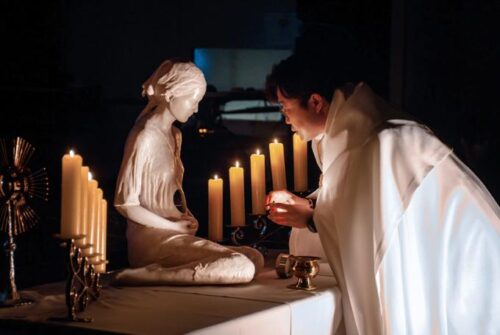
South Korea. Holy Hour in Seoul. âIt is a time of silence and contemplationâ. Photo: Hakuna
In the mid-term, initiatives such as excursions, workshops are proposed to them; Re.play: music with children living in less privileged neighbourhoods such as Torreblanca in Seville or Aluche in Madrid, (workshops on guitar, singing, composition, musical games, talks, excursions, concerts, recordings); Mano a mano (hand-to-hand): artistic workshops to work with crafts and promote creativity among women or families with few resources. These are combined with dynamics of spiritual content, âSoulâ, where topics such as affectivity, wounds, are dealt with; or Between the Lines: sharing of perspectives and life experiences of older and younger people based on the reading of certain texts (from novels, essays, poems, fables), creating bonds of family and helping to take care of each other.
In addition, every July, groups of university students travel to different parts of the world in order to initiate these experiences of compartiriado in those places. Last year, they travelled to Ecuador, Mexico, Argentina, Romania and also within Spain.
Soul College
The latest adventure that Hakuna has embarked on is Soul College, a training centre that aims to provide responses to the questions that every person asks in life: Who am I? What am I called to?
Soul College was born out of the thirst of many young and not-so-young people of Hakuna, to be educated, to know more and to go to the source. âAt Soul College we are not looking for scholars, only people who want to be transformed by knowledge, who want to enjoy being peopleâ. This training has already launched several courses in theology – with the help of university professors – theology of the body, anthropology,
art and so on.
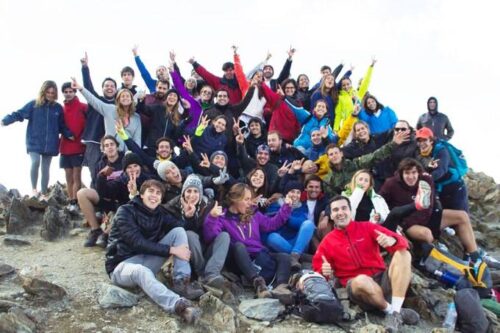
âWe believe that there are experiences in which we share and grow together, preserving the beauty and truth of each way and style of lifeâ. Photo: Carlos GonzĂĄlez
The most surprising thing about this initiative is that it has built bridges, and on courses such as Genesis or the Synoptic Gospels, students from 20, 30 or 50 years of age coincide, which greatly enriches the sessions. All of them end with a round of questions and a brief âsnackâ with the teacher. There are also many other initiatives at Hakuna, such as the pre-matrimonial course, the revolcaderos (faith groups of 8-10 people that meet every two weeks around a formative theme). There are also what we call God Stops, Pit Stops, which can be found in Spain, the rest of Europe, America and Asia, for those who let themselves go and âmake a fussâ wherever Life takes them. (Open Photo: Hakuna)
Maca Torres



